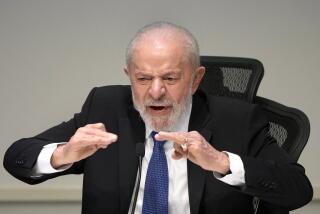Mandela Rejects Plan for Interim Rule
- Share via
JOHANNESBURG, South Africa — Nelson Mandela on Saturday flatly rejected the government’s proposal that an elected “executive council” replace the presidency during the transition to a new constitution, calling it a mockery of democratic principles aimed at keeping the white National Party in power.
“We are distressed to note that our compatriots in the National Party still have such grave reservations about democracy,” Mandela said. “It is evident that what they really seek is the continued incumbency of the National Party, even in the event that it loses an election.”
Mandela’s stance, the first official reaction from his African National Congress, seemed certain to kill the executive council proposal, which President Frederik W. de Klerk made public with great fanfare Thursday.
At this stage of the negotiation process, agreement between De Klerk and the ANC, the country’s largest black political group, would be required before any transitional government proposals can be approved.
De Klerk’s proposal also was rejected by Mangosuthu Gatsha Buthelezi, leader of the Inkatha movement and a rival of Mandela’s. Buthelezi said any such proposal should be put to voters in a referendum.
The government, the ANC and 19 other political groups have been negotiating for four months in an attempt to reach an agreement on steps the country will take toward writing a new constitution.
The clash between De Klerk and Mandela reflected the logjam that has developed in negotiations between their representatives at the Convention for a Democratic South Africa, the national negotiating forum. And it brought the debate, which has been conducted behind closed doors, into the public arena for the first time.
The National Party, in a statement Saturday, said it was surprised that Mandela had rejected its proposal, and it scoffed at his suggestion that an elected executive council of three to five leaders, with a rotating chairmanship, would be undemocratic.
Such a council would effectively give leaders of the largest parties, probably including both Mandela and De Klerk, an equal say in executive decisions.
Mandela, in a speech at the University of the North, where he was installed as chancellor Saturday, said the outcome of De Klerk’s transitional government proposals “will not be an interim government that enjoys the confidence of the majority of South Africans but a slightly refurbished National Party government.”
The ANC wants the new constitution to be written by a “constituent assembly,” selected in a one-person, one-vote election on the basis of proportional representation by party.
The government says the ANC’s proposals would not provide enough protection for whites and other minorities.
It wants the constitution written by a transitional government, which would include separate, multiracial national elections for the executive council and for a two-chamber Parliament.
Under De Klerk’s plan, one house of Parliament would be elected by proportional representation in a one-person, one-vote election.
In the other chamber, each region would have equal representation. That government would then remain in place for a decade or longer while it drew up a new, permanent constitution.
More to Read
Sign up for Essential California
The most important California stories and recommendations in your inbox every morning.
You may occasionally receive promotional content from the Los Angeles Times.














